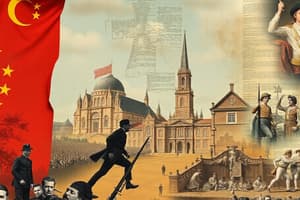Podcast
Questions and Answers
¿Cuál fue uno de los principales factores que desencadenó la Guerra de Sucesión Española?
¿Cuál fue uno de los principales factores que desencadenó la Guerra de Sucesión Española?
¿Quién fue uno de los pretendientes al trono español tras la muerte de Carlos II?
¿Quién fue uno de los pretendientes al trono español tras la muerte de Carlos II?
¿Quién apoyó a su nieto, Felipe de Anjou, para reclamar el trono español bajo el nombre de Felipe V de España durante la Guerra de Sucesión Española?
¿Quién apoyó a su nieto, Felipe de Anjou, para reclamar el trono español bajo el nombre de Felipe V de España durante la Guerra de Sucesión Española?
¿Qué región se vio especialmente afectada por disputas territoriales y religiosas durante la Guerra de Sucesión Española?
¿Qué región se vio especialmente afectada por disputas territoriales y religiosas durante la Guerra de Sucesión Española?
Signup and view all the answers
¿Quién era conocido por ser un estratega militar británico y por sus victorias decisivas durante la guerra?
¿Quién era conocido por ser un estratega militar británico y por sus victorias decisivas durante la guerra?
Signup and view all the answers
¿Qué figura femenina organizó grupos de resistencia en Flandes y Liège durante la Guerra de Sucesión Española?
¿Qué figura femenina organizó grupos de resistencia en Flandes y Liège durante la Guerra de Sucesión Española?
Signup and view all the answers
¿Quién desempeñó un papel importante en la oposición a la expansión francesa en Europa Central durante la Guerra de Sucesión Española?
¿Quién desempeñó un papel importante en la oposición a la expansión francesa en Europa Central durante la Guerra de Sucesión Española?
Signup and view all the answers
Durante la Guerra de Sucesión Española, ¿qué proceso gradual se observó relacionado con las libertades intelectuales y el pensamiento racional?
Durante la Guerra de Sucesión Española, ¿qué proceso gradual se observó relacionado con las libertades intelectuales y el pensamiento racional?
Signup and view all the answers
¿Qué pensadores surgieron durante la Guerra de Sucesión Española y contribuyeron significativamente a la propagación de conceptos filosóficos progresistas?
¿Qué pensadores surgieron durante la Guerra de Sucesión Española y contribuyeron significativamente a la propagación de conceptos filosóficos progresistas?
Signup and view all the answers
Study Notes
War of the Spanish Succession: A European Conflict over Inheritance
The War of the Spanish Succession (1701–1715) was a pivotal event in early modern European history, engulfing much of Europe with conflicts arising from the death of King Charles II of Spain without heirs. This sprawling conflict is marked by its interconnectedness with other events like the ongoing rivalry between the Bourbon dynasty and Hapsburg monarchy, as well as by the spread of enlightened ideas through La difusión de la ilustración.
Causes
Charles II's passing without offspring left Spain without a clear royal successor, prompting multiple factions within Europe to stake their claims on the Spanish throne. These claimants included Philip of Anjou, grandson of Louis XIV of France; Archduchess Maria Anna of Austria, daughter of Leopold I, Holy Roman Emperor; and Prince Eugene of Savoy. Each power sought to bolster their own influence, ultimately leading to armed confrontations among them.
Furthermore, religious tensions exacerbated these territorial disputes, especially in regions such as Flanders, Catalonia, and Italy where Catholicism vied against various Protestant sects. Additionally, economic interests played a significant role in nations' decisions to enter this struggle.
Key Figures
This war witnessed the rise of several prominent individuals whose actions shaped the outcome. On one side stood King Louis XIV of France, who supported his grandson, Philip of Anjou, in claiming the Spanish throne under the name Philip V of Spain. At the center stage stood John Churchill, Duke of Marlborough—a British military strategist known for decisive victories throughout the war. Principessa Sophia Carlotta di Borbone, better known as Charlotte of Belgium, also made strides during this period by organizing resistance groups in Flanders and Liège. Finally, Joseph I, Holy Roman Emperor, was instrumental in opposing French expansion across Central Europe.
La Difusión de la Ilustración
During the War of the Spanish Succession, we observe a gradual increase in intellectual freedoms and rationalistic thought processes—an occurrence commonly referred to as the Enlightenment. While the war did not directly cause illuminating ideologies to take root, it did provide fertile ground for their development due to the open exchange of cultural knowledge brought forth by varied nationalities interacting amidst conflict. Thinkers like Voltaire, Leibniz, Locke, and Montesquieu emerged during this time and contributed significantly to the spread of progressive philosophical concepts. Their works challenged traditional viewpoints and set the foundation for future revolutions like the American Revolution and French Revolution. Consequently, the War of the Spanish Succession can be seen as playing a role in ushering in a new era of intellectual curiosity and progress for humanity.
Studying That Suits You
Use AI to generate personalized quizzes and flashcards to suit your learning preferences.
Description
Descubre más sobre la Guerra de Sucesión Española (1701–1715), un evento clave en la historia europea que surgió de la muerte del Rey Carlos II de España sin herederos. Conoce las causas detrás de este conflicto, los personajes principales involucrados y cómo contribuyó a la difusión de ideas ilustradas durante la La difusión de la ilustración.




